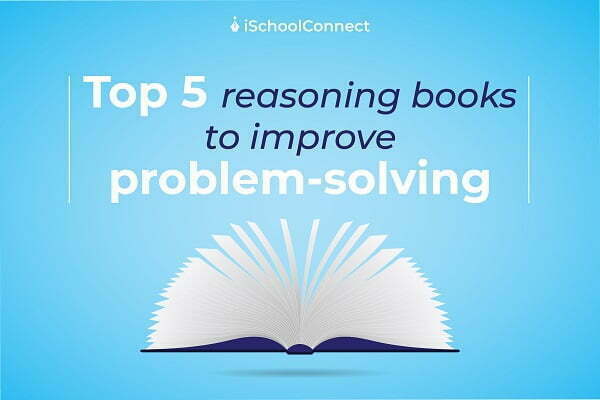Table of Contents
- Reasoning books | An overview
- But first, what is reasoning ability?
- Components of Logical Reasoning
- Types of Reasoning books
- Best Reasoning books
- 1. A Modern Approach to Verbal & Non-Verbal Reasoning by R.S. Agarwal
- 2. Shortcuts in Reasoning (Verbal, Non-Verbal, Analytical & Critical) for Competitive Exams by Disha Experts
- 3. Analytical Reasoning by MK Pandey
- 4. How to Crack Test of Reasoning by Arihant Experts
- 5. A New Approach to Reasoning Verbal & Non-Verbal by B.S. Sijwali & Indu Sijwali
- Some bonus reasoning books for you!
- Key takeaways
- FAQs
Reasoning books | An overview
If you have ever prepared for a competitive exam or are planning to prepare for one, then you must have come across the category ‘reasoning books.’ These are essential study materials that prepare you to successfully solve any competitive exam’s reasoning and aptitude sections.
In order to understand better what a reasoning book is and what the best ones in the market are right now, let us delve into the article.
But first, what is reasoning ability?
Reasoning ability refers to the skills and strategies employed to draw inferences, reach conclusions, arrive at solutions, and make decisions based on evidence. Reasoning ability is diverse and studied in different subjects such as psychology (differential, cognitive), neuroscience, education, genetics, philosophy, and artificial intelligence.
There are different kinds of reasoning, such as-
- Deductive Reasoning- It involves arriving at solutions from a set of premises either in the form of symbols or syllogisms.
- Inductive Reasoning- Here, we use examples to suggest rules that can be applied to instances.
- Abductive Reasoning- This type of reasoning entails arriving at the most practical set of solutions for a given set of facts.
- Bayesian Reasoning- It involves applying probability theory to the given information.
- Analogical Reasoning- It is based on discovering a common relational system between two domains, exemplars, or situations.
- Critical Thinking- This involves viewing various situational perspectives, the power of critically observing the situation, and then coming up with solutions.
- Intuition- It relates to the power of the subconscious to arrive at a decision. Although skeptics believe that a lack of scientific rationality makes this for weaker reasoning ability, this skill is often used profusely, mainly by scientists, leaders, and others in positions of power.
Reasoning ability is a key skill that comes into play even in your day-to-day life. Reasoning does not just use critical thinking to make a decision but also makes use of other factors such as background, the individual’s experiences, emotions, and knowledge.
Components of Logical Reasoning
The reasoning problems are usually formed with 3 components, namely-
- Passage, which refers to the piece of text through which the information is derived to answer the questions. There can be one or more arguments in the form of a story, statements, passage, etc.
- The second component consists of questions related to the passage or the argument.
- Lastly, the options are the next set of components where the exam takers get four to five options to choose the correct answer. Sometimes, more than one correct answer to a question is given in the option. Students need to gauge the question correctly to identify the correct answer(s).
Now, let’s dive in to learn about the types of reasoning books before learning about the best reasoning book.
Types of Reasoning books

1. Verbal Reasoning books
Verbal reasoning books teach you how to reason and understand concepts framed in words by allowing you to think critically and constructively. It is actually a test of one’s skill rather than testing one’s knowledge.
You will encounter various chapters in some of the best reasoning books. These include-
- Letter sequences
- Cracking codes that are based on numbers and letters.
- Knowing how to read and follow instructions thoroughly.
- Learning how to spot words inside words.
- Finding letters and how to complete other words.
2. Non-Verbal Reasoning books
Non-verbal reasoning books teach you how to solve diagrams and pictures. It tests your ability to study visual information and come to conclusions. You will often be asked to study the diagram series and spot the odd diagram or the next one in the sequence.
3. Maths Reasoning books
Often the best books for logical reasoning will also comprise a mathematical reasoning part. This segment is highly crucial to make your preparation for the competitive exams easy as a significant chunk of your aptitude test will have mathematical problems. These problems ask you to apply the concepts and skills to unique problems as efficiently as possible in the shortest time possible. Therefore, it is safe to say that such problems test your speed, mastery, and clarity over your mathematical concepts.
Best Reasoning books

Some of the best books for reasoning available in the market are the following-
1. A Modern Approach to Verbal & Non-Verbal Reasoning by R.S. Agarwal
This is a top-rated book in the market, even recommended by teachers. This reasoning book helps you prepare for various competitive exams, especially for insurance and banking-related exams. Verbal reasoning comprises mental ability and logical deduction, while the non-verbal section contains classification, mirror-images, rule-detection, and series, to name a few.
2. Shortcuts in Reasoning (Verbal, Non-Verbal, Analytical & Critical) for Competitive Exams by Disha Experts
This reasoning book is excellent for those who want to revise tricks and shortcuts quickly. This is among the best reasoning books as it teaches you how to solve analytical questions quickly.
3. Analytical Reasoning by MK Pandey
This reasoning book helps make your basics strong by giving you detailed knowledge of logic. Going through this book thoroughly will help you minimize silly mistakes in the exam when you are under pressure.
4. How to Crack Test of Reasoning by Arihant Experts
How to Crack Test of Reasoning is among the perfect reasoning books if you have already completed your basics and want to apply your knowledge to the test. This reasoning book comes with over 2500 MCQ questions and is lucid for easy comprehension. Therefore, if you are preparing for any competitive exam, grab a copy of this reasoning book.
5. A New Approach to Reasoning Verbal & Non-Verbal by B.S. Sijwali & Indu Sijwali
This reasoning book is structured in a beginner to an advanced format. Here, you can go through the basic concepts in the first section. After that, you can advance to the more challenging aspects of the same topics in the next section. This structure is helpful for quick revision right before the exams.
Some bonus reasoning books for you!
Besides the above 5 books, you can also refer to the below-mentioned to practice well.
| Books | Author(s) |
| Multidimensional Reasoning | Mishra and Kumar Dr. Lal[Upkar’s] |
| Reasoning for Competitive Exams | K. Sinha Nishit [Pearson] |
| Visual Intelligence for Beginners | Matthew Alcot |
| Campus Recruitment Complete Reference | Praxis Groups |
Key takeaways
- Today, every competitive exam consists of a reasoning section to test your problem-solving and critical thinking abilities.
- Developing reasoning skills is crucial to scoring top marks in competitive exams. You need to practice every day to be at the top of your game.
- You can easily score well in this section by practicing from the best reasoning books.
- Talking about the best reasoning book, the resources mentioned above are our best recommendations.
Now that you know about the best reasoning books, practice well and crack that exam. If you have any questions/suggestions, drop a comment below or reach out to us.
Liked this blog? Read next: GRE books | 10 books you must have to ace this exam!
FAQs
Q1. Are reasoning books important for job interviews?
Ans- Many corporate companies have an initial test round to test your verbal reasoning and non-verbal reasoning skills. This helps them evaluate your problem-solving abilities. Therefore, practicing from reasoning books can help you crack the initial tests.
Q2. Why is reasoning ability important for a job role?
Ans- The reasoning ability is considered as a key skill for employers nowadays because-
- A person employed as a tester has to use their reasoning abilities to determine why the designed program is not functioning on the platform.
- A human resource person has to use this skill to understand why there are differences in the team.
- A leader or a manager needs this skill to prioritize work and allocate tasks.
- A quality analyst employs this skill to figure out why there are issues with quality (if any).
Q3. What kinds of tests are used for judging reasoning ability by recruiters?
Ans- A recruiter would typically test you on the following domains –
- Verbal reasoning
- Numerical reasoning
- Abstract reasoning
- Logical reasoning
- Mechanical reasoning
To be ready for your job interview, you can purchase logical reasoning books and practice.
Q4. Which competitive exams have the reasoning section?
Ans- Today, almost all competitive exams have a reasoning and logical aptitude paper. So, we recommend you get a reasoning book and practice it thoroughly.
Q5. How do I prepare for GMAT Critical Reasoning?
Answer- The first step to improving at GMAT Critical Reasoning is learning to understand the question/argument before looking at the answer choices. You can do this by breaking down every passage and understanding the structure.
Once that is done, you’ll be clear about what is being asked and optimize the process of approaching the question.
Make sure you are attempting and analyzing mock tests properly. Also, it is always wise to leave the difficult questions for the end.
Q6. What are the types of reasoning questions asked in competitive exams?
Answer- Various types of reasoning questions include-
- Seating Arrangement
- Coding-Decoding
- Ranking or Direction Test
- Blood Relations
- Data Sufficiency, etc.







